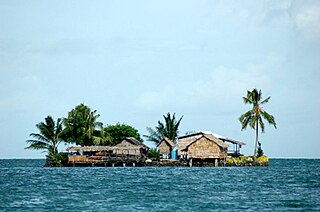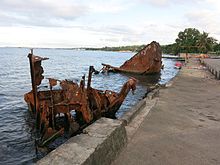
Solomon Islands is a country consisting of six major islands and over 900 smaller islands in Oceania, to the northeast of Australia. It has a land area of 28,400 square kilometres (11,000 sq mi), and a population of approximately 700,000. Its capital, Honiara, is located on the largest island, Guadalcanal. The country takes its name from the wider area of the Solomon Islands (archipelago), which is a collection of Melanesian islands that also includes the Autonomous Region of Bougainville, but excludes the Santa Cruz Islands.

Auki is the provincial capital of Malaita Province, Solomon Islands. It is situated on the northern end of Langa Langa Lagoon on the north-west coast of Malaita Island. It is one of the largest provincial towns in Solomon Islands. It was established as the administrative center for Malaita Province in 1909.

Malaita is the primary island of Malaita Province in Solomon Islands. Malaita is the most populous island of the Solomon Islands, with a population of 161,832 as of 2021, or more than a third of the entire national population. It is also the second largest island in the country by area, after Guadalcanal.

The Archdiocese of Honiara is a Latin Church ecclesiastical territory or archdiocese of the Catholic Church in the Solomon Islands. It is the successor of the apostolic prefecture of the British Solomon Islands, which was erected in 1897. The ecclesiastical province of Honiara was created in 1978, the first such creation of Pope John Paul II, and contains two suffragan sees: Gizo and Auki (1982).

Lau Lagoon is a part of the Solomon Islands. It is located on the northeast coast of Malaita Island. The lagoon is more than 35 kilometers long and contains about 60 artificial islands built on the reef.

White River is a suburb on the fringe of Honiara, Solomon Islands and is located 3 kilometres (1.9 mi) west of the main center on the Tandai Highway. White River is in the Honiara City Council ward of Nggosi. A water spring supplies water to the community.

Honiara is the capital and largest city of Solomon Islands, situated on the northwestern coast of Guadalcanal. As of 2021, it had a population of 92,344 people. The city is served by Honiara International Airport and the seaport of Point Cruz, and lies along the Kukum Highway.

The Royal Solomon Islands Police Force (RSIPF) is the national police force of Solomon Islands and in January 2015 had an establishment of approximately 1,153 officers and 43 police stations across the country.
Solomon Islands is a sovereign country in Melanesia consisting of many islands with a population of 561,231 (2013). It became self-governing from the United Kingdom in 1976 after three previous attempts at forming a Constitution. The Constitution of Solomon Islands was enacted in 1978. This however led to conflicts between cultures and armed conflict in the late 1990s forced a review of the 1978 Constitution. This review resulted in the Federal Constitution of the Solomon Islands Bill 2004 (SI) and various other amendments. The Human Rights Chapter, however, remained unchanged.

Point Cruz is a peninsula in the center of Honiara, on Guadalcanal Island. Honiara is the capital city of the Solomon Islands. Point Cruz is located on the Tandai Highway, and is ¼ mile north of the Solomon Islands Parliament Building. Point Cruz is in the Honiara City Council ward of Cruz, and is East of Town Ground and West of Tuvaruhu.

The judiciary of Solomon Islands is a branch of the Government of Solomon Islands that interprets and applies the laws of Solomon Islands, to ensure equal justice under law, and to provide a mechanism for dispute resolution. The legal system is derived from chapter VII, part II of the Constitution, adopted when the country became independent from the United Kingdom in 1978. The Constitution provided for the creation of a High Court, with original jurisdiction in civil and criminal cases, and a Court of Appeal. It also provided for the possibility of "subordinate courts", with no further specification (art.84).

The Solomon Islands national rugby league team represents Solomon Islands in the sport of rugby league football. They are, in fact, planning a top-level tournament in 2010–11, after the capital of Honiara hosts an inter-city exhibition league, the Honiara Rugby League; expected in August 2009 but now it seems early 2010 will be the most convenient point for when it will be held after an uphold in the delivery of the participating teams jerseys caused delays. They are an unaffiliated nation and were recognised by the RLIF as having official observer status in early 2009. They are scheduled to participate in their first-ever test match against a touring New South Wales Police Team in November 2010.

Rove is a suburb in Honiara located 2 kilometres (1.2 mi) west of the main center on the Tandai Highway. Rove borders the Honiara City Council ward of Nggosi and Rove-Lengakiki.
Town Ground is a suburb in Honiara, Solomon Islands, located in the main center on the Tandai Highway. Town Ground is in the Honiara City Council ward of Nggosi and Rove-Lengakiki.

Vuhokesa is a suburb in Honiara located in the main center on the Tandai Highway and includes the City Council roundabout. Vuhokesa is in the Honiara City Council ward of Vavaea. and is East of Point Cruz and West of Lord Howe Settlement. The Vuhokesa border is the West bank of the Mataniko River which runs into Kua Bay.
Prostitution in the Solomon Islands is legal but related activities such as soliciting and brothel keeping are prohibited. Prostitution occurs mainly in the capital, Honiara, and around logging camps in Makira, Malaita and Isabel islands. Many of the women involved have turned to prostitution due to poverty, some starting at the age of 13. The laws are rarely enforced.
Maureen Sariki is a market vendor, and president of the Honiara market vendors' association, from the Solomon Islands.
Merle Aqorau, MBE is a Solomon Islander and social worker who was instrumental in the development of the women's movement in the Solomon Islands. Engaged as a social welfare officer, she established women's clubs in various locations throughout Melanesia, founded a YWCA training centre to assist young women in continuing their education and worked as the regional secretary of the United Church Women's Fellowship (UCWF). Her pioneering service to women in the Solomon Islands was recognised, when she was awarded an MBE in the Order of the British Empire in 2016.
The Honiara City Council is an organisation that looks after the municipal affairs of Honiara, the capital city of the Solomon Islands on Guadalcanal Honiara is divided into twelve wards, each of which elect one councillor. There are eight extra councillors. Four are appointed by the Solomon Islands Minister of Home Affairs, and members of parliament representing the city are included, along with the premier of Guadalcanal province. The assembled council selects a mayor from one of the elected twelve.















